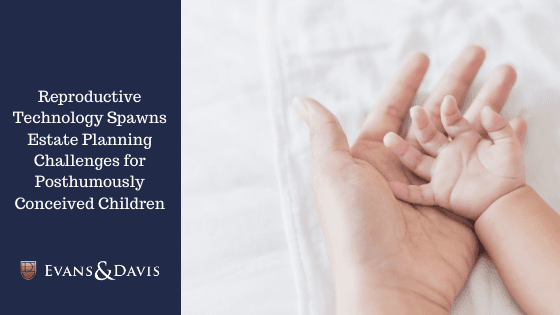
Originally published in The Oklahoman by Paula Burkes.
https://oklahoman.com/article/...
How is a posthumously birthed child — or a child conceived before, but born after, the death of a parent — treated in estate planning?
Under most state laws and the Uniform Parentage Act, such children are treated equal with any other biological children. However, advanced reproductive technology such as sperm banking or using frozen eggs/embryos has given way to a new phenomenon: posthumously conceived children, or children created after one or both parents have died. Obviously, this raises new questions about how these situations should be handled in estates and trusts.
You mean, for example, that a biological father didn't agree, before his death, to any future posthumously conceived children using his sperm or fertilized eggs?
Yes. Under the old rule would such babies would be treated as a “nonmarital” children, and those children would receive nothing because the father never consented to the birth of Baby 2. But in Martin B., 841 N.Y.S.2d 207 (2008), a New York court ruled a grantor’s posthumously conceived child was the grantor’s “issue” and “descendant” within the meaning of a trust and the child was treated the same as the other children. In this case, the court admitted its interpretation of the trust was a “sympathetic” reading of the trust instrument, primarily because, at the time the trust was created, the creator of the trust couldn't have contemplated or foreseen the way in which the children would be conceived as biotechnology had not advanced that far yet. In the past 10 years, there's more awareness about reproductive technology, so a court may not be as sympathetic today.
Does the same treatment apply to government benefits?
Not necessarily. In 2012, the United States Supreme Court held that a posthumously conceived child wouldn't be entitled to a father’s Social Security, unless the child was entitled to receive an inheritance under state law. Astrue v. Capato ex rel. B.N.C., 566 U.S. 541 (2012). Effectively, the court established that each state can decide how they would address this issue. This is still an unsettled matter in Oklahoma and many states, and will likely continue to be for some time.
What's the bottom line?
If you or someone you know has used, is using, or is planning to use reproductive technologies, they need to ensure their estate plan accounts for it. Otherwise you may end up with an unintended consequence.


